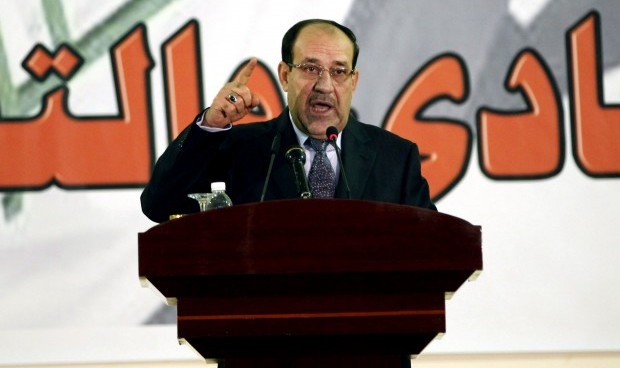Following the unrest in the country, the Iraqi Prime Minister called for MPs to boycott the next parliamentary session. He said that “the session will be aggravating and hectic since both Ba’athists and non-Ba’athists advocates of violence and sectarianism will be active.” Al-Maliki said that he considered Iraq’s parliament a “major partner of the unrest in the country,” adding that recent events could only be described as a coup.
The political conflict in Iraq has become a threat to the country’s national components, existence, and unity. This conflict is a sectarian one that has unexpectedly escalated under Maliki’s rule. The division in Iraq is caused by this one man who wishes to expand his powers and influences irrespective of the legitimate political process. Accordingly, Maliki is depicting his Sunni and Shi’ite opponents as sectarian or Ba’athists.
By attacking the parliament and accusing it of causing unrest and sectarian tensions in the country, Maliki is not only demonstrating authoritarian tendencies but also undermining Iraq’s political process. His actions disregard the elected parliament, which is the legislative power that guarantees the functioning of political process and implements and defends the constitution. In fact, this signifies that Maliki is plotting a coup to impose autocratic rule in Iraq. Therefore, Maliki is no different from Bashar Al-Assad since they both consider themselves above the law and the constitution, describing what is taking place in their countries as nothing but a foreign and sectarian plot. Like Assad, Maliki considers the incidents in Al-Anbar province as part of a sectarian plot sponsored by foreign powers.
I have a question for Maliki and his supporters: What foreign powers would sponsor Moqtada Al-Sadr, for example, considering that the two are in the midst of an immense political conflict? Moreover, it is Sadr’s movement that called for an emergency session in parliament, a decision that the prime minister attacked and refuted.
A reasonable interpretation of what is going on in Iraq and of Al-Maliki’s behavior—given that sectarianism is on the rise—is that the prime minister is plotting a coup to return Iraq to an even worse state than it was in under the rule of Saddam Hussein. This is nothing more than a sectarian coup led by a “Shi’ite Saddam” that is threatening the future of Iraq.
Osama al-Nujaifi, speaker of the Iraqi parliament, was absolutely right to accuse Al-Maliki of “rebelling” against the constitution and showing “indifference” towards the blood of the Iraqi people. Maliki’s boycott and attack of the parliament can only be interpreted as a first step towards his sectarian coup.
